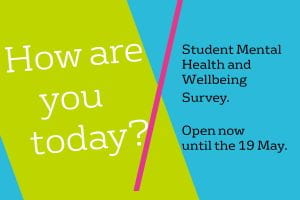
By Professor Sarah Purdy, Pro Vice-Chancellor (Student Experience).
Young adults today are more likely to experience mental health problems than previous generations and around three in four adults who experience a mental illness will have symptoms before the age of 25[1].
Bristol takes its commitment to these issues very seriously and last year introduced an institution-wide Student Mental Health and Wellbeing Survey in partnership with the Bristol SU. The survey was responded to by over 5,700 students, making it one of the largest pieces of research into student mental health in the UK. It deepened our understanding of the issues affecting Bristol students and gave us valuable insight on how the support we provide is viewed.
The responses to the Survey in 2018 helped shape the University’s new Student Mental Health and Wellbeing Strategy which outlines the work we’ll be doing to improve support for our students’ mental health and wellbeing. We’ve already began to implement some of the work highlighted in the strategy and hope the responses to this year’s Student Mental Health and Wellbeing survey will tell us if we’re on the right track – and inform us of what we can do better if not.

The survey for 2019 is now open and students can complete it at SMHW 2019.
Offering enough support to students is a must for any University. Keeping the channels open between us and our student community for conversation is essential to ensure that support is not only on offer, but right for them. The annual Student Mental Health and Wellbeing Survey is one such channel that provides our students an opportunity to have a confidential and frank discussion about what we offer and how we can continue to improve.
Last year’s findings have already done a huge amount towards our understanding of what our students are experiencing and their expectations. I hope this year’s findings will be equally insightful.
Here’s what we have done so far since last year’s survey.
Student wellbeing
Bristol students reported issues with their wellbeing, and one in four students said they didn’t have someone to talk to about their day-to-day problems.
Our Residential Life and Student Wellbeing Services are now providing 24/7 support for student wellbeing in residences and schools; helping students to manage their wellbeing proactively and ensuring there’s always someone to speak to for additional information, advice and support. We’ve also worked with Bristol SU to deliver the Bristol SU Living Room in Senate House; a space to relax, unwind and connect with other students whilst on campus.
Mental health
More than one in three Bristol students have experienced a diagnosed mental health problem at some point in their lives, and 80% of students with a mental health problem have seen a doctor since beginning University.
Additional University funding enables our Students’ Health Service to provide extended same day GP mental health appointments, and specialist support for students who have complex mental health conditions that require longer term psychological intervention. We’ve also increased the funding of our Mental Health Advice Team who support students with enduring mental health conditions to manage their healthcare needs alongside their studies.
Marginalised groups
Poor mental health and wellbeing were considerably more prevalent in marginalised groups, including BME students, international students, LGBT+ students, and students from lower socio-economic backgrounds.
The University has strengthened the Student Inclusion Service to ensure services are equally accessible and effective in supporting these groups. They’ve worked with students to create Black Men Talk, a peer support group for black male students, and work is progressing to start a black women’s group. We’re also working with external partners, such as Nilaari, to provide culturally appropriate therapies for students who think this may be more helpful.
Drug use, including alcohol
50% of undergraduates had used cannabis and 39% had used another illicit drug since starting at University. Mental illness was more prevalent among students who indicated that they’d used drugs.
We’ve joined a multi-agency drugs group which includes UWE, Public Health, Bristol Drugs Project and Avon and Somerset Police to work on city-wide developments and share expertise and best practice. An interactive panel event attended by 80 students and staff explored how we best support our students whilst not encouraging substance use. Up to 50 student-facing staff are due to receive training on the current trends of drug use amongst students and how to help reduce harm.
Sexual misconduct
More than one in ten female respondents had experienced sexual assault.
Report and Support has been launched to enable students and staff to report anonymously, seek advice or make a formal complaint about the behaviour of a fellow student or member of staff. A senior group of staff and students from across the University participated in a workshop facilitated by Lime Culture to agree how our current arrangements for dealing with sexual misconduct will develop. Staff have been trained as Sexual Violence Liaison Officers to ensure we can respond appropriately to victims of sexual violence in the aftermath of an assault to provide high-quality, safe and effective support.
Staff
For specific support for staff, please visit the staff wellbeing site.
Students
For specific support for students, please visit our Health and wellbeing site.
[1] Kessler, R. & Wang, P., 2008. The Descriptive Epidemiology of Commonly Occurring Mental. Annual Review of Public Health, Volume 29, pp. 115-126.
